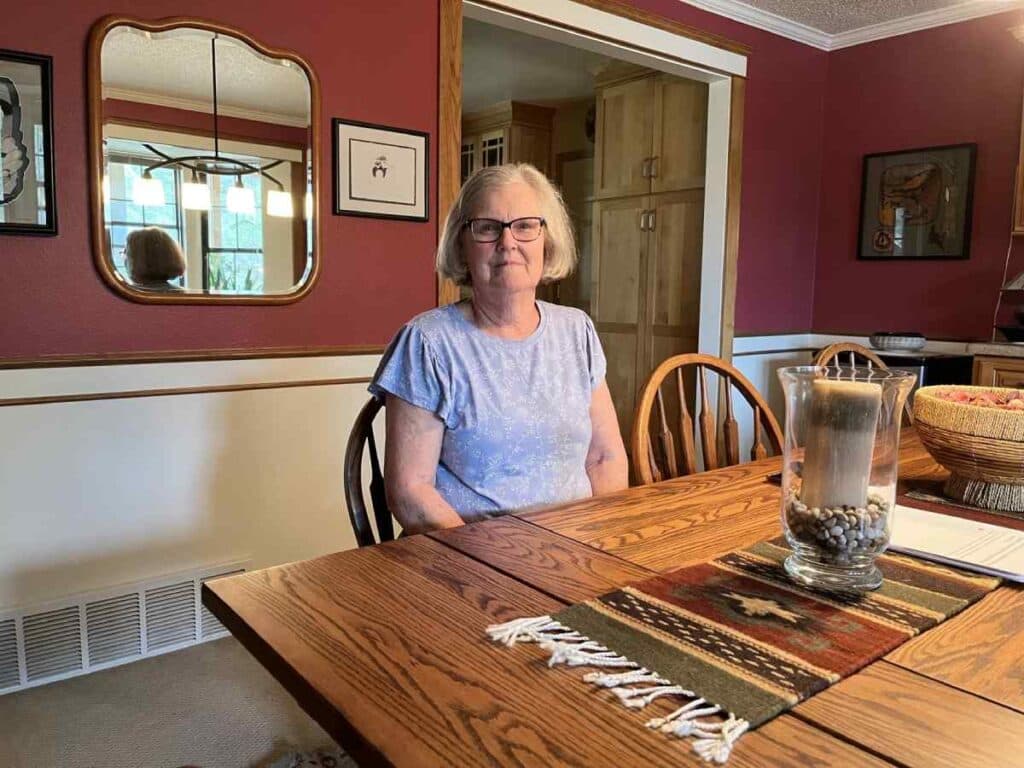
This story was originally published on kunc.com.
For Alex Siggers, a graduate student studying ecology at Colorado State University, Fort Collins is a perfect balance between urban living and easy access to nature.
"You see what Fort Collins has. It's hard to give that up," Siggers said on a recent Sunday morning, taking in the view from the city's Fossil Creek Park.
But he might have to give it up once he graduates because finding housing he can afford has been a constant struggle since he moved there four years ago. He had to move out of his first apartment after a year because the landlord increased his rent by $400 per month.
He's bounced from rental to rental ever since. Now, he's sharing a house on the outskirts of town with his brother and fiancé, and he still spends about half his income on rent. That doesn't leave much left over.
"It's not accounting for car insurance and phone bills and all the other bills that I'm paying," Siggers said. "God forbid, we want to go anywhere, do anything, a couple of times a month. That puts me at my capacity."
Siggers is one of many Coloradans struggling to make rent these days. The Bell Policy Center, a progressive think-tank, found that half of renter households are cost-burdened, meaning they spend more than a third of their income on rent. In Fort Collins alone, according to city data, rents increased by almost 125% between 2010 and 2020. Over the same period, wages only increased about 25%.
Housing advocates argue the increase in corporate ownership of rental properties, and their use of computer algorithms that use artificial intelligence to set rents, is driving up rents and unfairly manipulating the market.
The Bell Policy Center also cites data showing that corporate landlords now own almost a fifth of Colorado apartments, the third highest share in the country. A report published last year by the Biden administration looked at Denver and found that the use of algorithms pushes rents up by more than $100 per month in the city.
"When these homes are owned by national, publicly-traded corporations, they're beholden to their shareholders, who demand the maximum amount of profit possible that the market will reap," said Jack Regenbogen, a housing attorney and deputy executive director of the Colorado Poverty Law Project.
Opponents of rent-setting technology argue corporate property owners are also sharing rental and occupancy information with each other, feeding the data into the algorithms and manipulating the market in their favor.
"This contributes to a vicious self-fueling cycle, or a race to the top, where landlords are raising rents to the maximum level possible based on proprietary information of their competitors," Regenbogen said. "Ultimately this results in higher rents, higher eviction rates and greater displacement."
Colorado, nine other states and the Department of Justice sued several corporate landlords earlier this year, claiming their use of algorithms amounts to illegal collusion. Litigation in the case is ongoing.
Colorado lawmakers also passed a bill this spring to ban rental algorithms altogether, but Governor Polis vetoed the measure, arguing the bill would have eliminated tools that help fill vacant apartments. Polis said, if there is illegal collusion happening, companies should be held accountable under existing law. "This bill may have unintended consequences of creating a hostile environment for providers of rental housing and could result in further diminished supply of rental housing based on inadequate data," Polis said in his veto statement.
Drew Hamrick, with the Colorado Apartment Association, also opposed the legislation and testified in front of the legislature this spring that, without the algorithms, there would be erratic pricing and more housing units sitting empty.
"Making accurate pricing allows you to house more people with fewer units. This is an optimization tool that is valuable to our industry," Hamrick said.

But even some small landlords say the algorithms are hurting them.
"I get really frustrated with this whole idea of the algorithm, because it feels to me that we have huge corporations creating unfair advantages by having information that a mom-and-pop landlord wouldn't have," said Jill Armstrong, who has been renting out a house in Fort Collins for more than twenty years. "I think a lot of what's been going on lately is really anti-small business."
Armstrong has worked as a housing advocate in the past but is now retired and uses her rental property to provide a little extra money to cover unexpected expenses, not to maximize profits. But from her perspective, corporate property owners and their use of algorithms are making that more difficult.
Housing advocates say a variety of different types of property owners in the housing market increases competition and incentivises landlords to maintain fair prices.
"In a more distributed housing market, which mom-and-pop landlords definitely exhibit more than sort of the large aggregate landlords, you're going to see a lot more of that incentive to drive down rents and improve the quality of housing," said Lee Hepner, an attorney with the American Economic Liberties project, a national, non-partisan group that advocates against the concentration of economic power.
That means, according to Hepner, in a market with fewer mom-and-pop landlords and more corporate ones, rents will likely continue to increase and housing quality will decrease.
Copyright © 2025 KUNC

Colorado Capitol Alliance
This story was produced by the Capitol News Alliance, a collaboration between KUNC News, Colorado Public Radio, Rocky Mountain PBS, and The Colorado Sun, and shared with Rocky Mountain Community Radio and other news organizations across the state. Funding for the Alliance is provided in part by the Corporation for Public Broadcasting.









